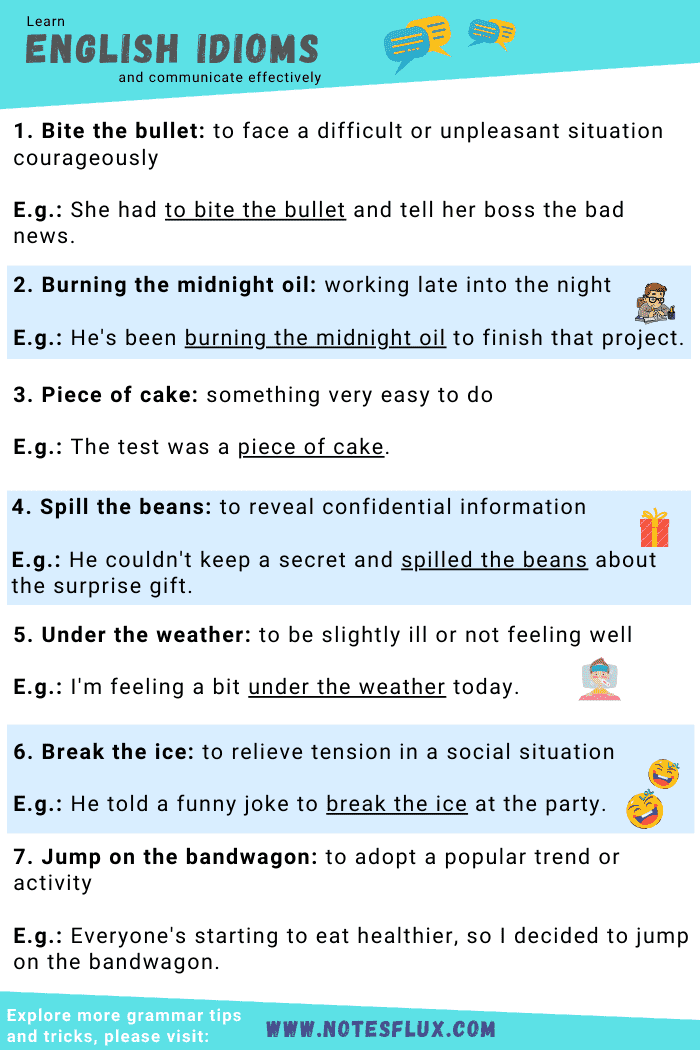An introduction to Idioms:
1. What are Idioms?
Idioms are fun phrases that mean something different from the usual meaning of their words. These phrases often carry unique meanings that can't be deduced from their constituent parts. In essence, idioms are like hidden treasures of language, adding depth and flair to communication.
1.1 Why use Idioms in the English language?
Understanding idioms is crucial for mastering a language and sounding more like a native speaker. They enrich language with vivid expressions, making conversations more colorful and engaging.
2. List of Idioms
| Idiom | Meaning |
|---|---|
| Get out of hand | Get out of control |
| A dime a dozen | Something common |
| Cutting corners | Do something easiest or cheapest way |
| Easy does it | Slow down |
| Hang in there | Don't give up |
| Hit the sack | Go to sleep |
| Call it a day | Stop working |
| Break a leg | Good luck |
| To live it up | To enjoy life |
| Wild goose chase | A useless journey |
| To smell a rat | To think that something is wrong |
| To give up | To quit |
| To be on top of the world | To be really happy |
| It's not rocket science | not complicated |
| Miss the boat | too late |
| On the ball | Quick to understand |
| Pull someone's leg | To joke with someone |
| So far so good | Things are going well |
| Under the weather | Sick |
| Break the ice | Remove the tension |
| Kill two birds with one stone | Get two things done with one action |
| Live and learn | Learn through your mistakes |
| Saving for a rainy day | Saving money for later |
| Peace of cake | Easy |
3. Examples of Commonly Used Idioms in the English Language:
4. Caution when using Idioms:
4.1 Do not overuse Idioms
Using idioms can enrich your language and make your speech or writing more colorful and engaging. However, exercising caution when using idioms is crucial. Overusing them or inserting them where they don't fit can lead to confusion and make your communication sound forced or unnatural.
4.2 Use Idioms where appropriate
One important consideration is context. Idioms often carry specific connotations or nuances, and misapplying them can miscommunicate your intended message. For instance, using an idiom like "break a leg" in a formal business meeting might sound out of place, as it's typically associated with show business and performances.
4.3 Use common or well-knowm Idioms
Additionally, not everyone may be familiar with every idiom, especially non-native speakers. Using obscure or highly regional idioms could leave your audience puzzled. It's best to choose idioms that have widespread recognition or offer explanations when introducing less common ones.
Furthermore, moderation is key. Riddling your speech or writing with idioms can make it hard to follow and dilute their impact. A well-placed idiom can be powerful, but using too many can make your communication seem clichéd or insincere.
Conclusion:
In summary, while idioms can enhance your language, it's important to use them judiciously, consider your audience's familiarity, and ensure they align with the context. When employed thoughtfully, idioms can bring flair and expressiveness to your communication.
Thanks for reading this article. We sincerely hope you enjoyed it.
If you noticed any mistake, or have suggestions for us, please let us know in the comments below. Thanks again.
